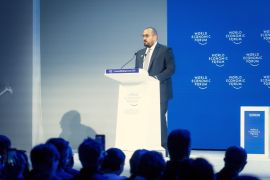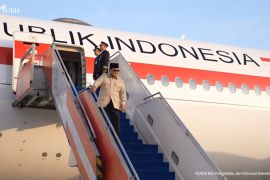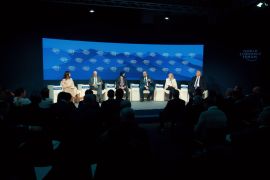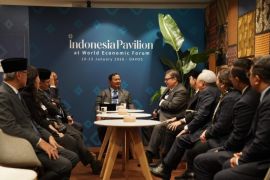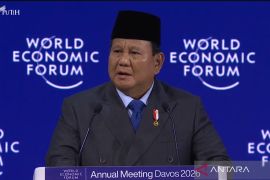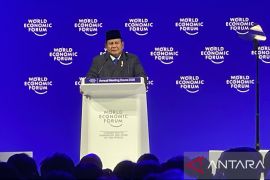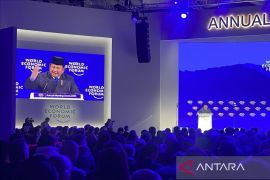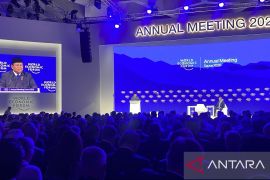The projects are WEF Partnership on Indonesian Sustainable Agriculture (WEFPISA) aimed at promoting food security and economic growth through sustainable agriculture; and Project Laser Beam (PLB), a US$50-million project to eradicate child malnutrition, with an initial focus on Indonesia and Bangladesh.
Bayu Krisnamurthi, Indonesia`s Vice-Minister of Agriculture, announced at the WEF event on Sunday (June 12) the formation of WEFPISA, formed with leaders of the WEF`s New Vision for Agriculture.
The WEFPISA initiative will engage global and Indonesian companies in partnership with the government, civil society, international organizations and farmers` groups.
Fourteen companies have committed to join the Indonesia initiative including Archer Daniels Midland, Bunge, Cargill, Dupont, Indofood, Kraft Foods, Metro Group, McKinsey, Monsanto, Nestle, Sinar Mas, Swiss Re, Syngenta and Unilever.
Partners will form a high-level group to improve the productivity and quality of specific commodities, with special attention to environmental sustainability and the expansion of opportunities for smallholder farmers.
This program will be implemented in the first three years and in the implementation of its implementation there will be regular reports submitted by the WEF forum in Davos in early 2012.
WEFPISA will apply the WEF`s New Vision for Agriculture strategy, which is centered on a 20-20-20 approach: a 20 percent increase in crop production, a 20 percent reduction in greenhouse gas emissions and a 20 percent decrease in rural poverty in 10 years.
In the past year, food security and economic crises have highlighted both the urgent need and the potential for developing sustainable agri-food systems. Over one billion people, or one out of six globally, do not have access to adequate food and nutrition today.
By 2050, the global population will grow to a projected 9.2 billion people, and demand for agricultural products is expected to double.
Farmers account for half of the one billion people who go without proper food and nutrition every day, a startling statistic given their central role in feeding the world.
According to some estimates, about 100 million people have descended into poverty worldwide in the wake of this crisis. Low and middle income groups are feeling the strain.
There was agreement that governments should intervene quickly by giving targeted support to the poor - hardest hit by rising prices.
Over 600 participants from 40 countries took part in the 20th anniversary of the WEF on East Asia in Jakarta. It is the first time that the World Economic Forum holds this meeting in Indonesia.
"Indonesia`s remarkable economic and political transformation is a positive reflection of the region`s growth and progress over the past two decades," said Sushant Palakurthi Rao, Director and Head of Asia of the World Economic Forum.
"But, new challenges such as inflationary pressures, resource scarcity and environmental degradation are looming. Therefore, this year`s meeting will focus on how leaders from East Asia will work together to address these issues and ensure sustainable growth into the future," he said prior to the WEF-EA event.
Key international public figures participating in the WEF event included Lee Hsien-Loong, Prime Minister of Singapore; Abhisit Vejjajiva, Prime Minister of Thailand; Batbold Sukhbaatar, Prime Minister of Mongolia; Pascal Lamy, Director-General, World Trade Organization (WTO); Surin Pitsuwan, Secretary-General, ASEAN; Rajat M. Nag, Managing Director-General, Asian Development Bank; Naoyuki Shinohara, Deputy Managing Director, International Monetary Fund (IMF); Taleb Rifai, Secretary-General, World Tourism Organization (UNWTO); and Supachai Panitchpakdi, Secretary-General, United Nations Conference on Trade and Development (UNCTAD).
At the WEF event on Monday (June 13), the Indonesian government and the World Food Program (WFP) announced the public-private sector partnership called Project Laser Beam (PLB) worth 50 million US dollars to eradicate child malnutrition in Indonesia and Bangladesh.
"The Indonesian government is committed to eradicating poverty and ensuring the health of every Indonesian child," Indroyono Soesilo, the secretary to the Coordinating Minister for People`s Welfare, said at a press conference.
He welcomed the Project Laser Beam as a new and creative pillar to fight against child malnutrition and significantly contributed to the successful implementation of the Millennium Development Goals (MDGs).
PLB was unveiled in September 2009 by PLB founding partners including World Food Program (WFP), Unilever, Kraft Foods, DSM and the Global Alliance for Improved Nutrition (GAIN).
Other partners are among other things PT Tiga Pilar Sejahtera Tbk., Garuda Food, Indofood, and Rabobank.
WFP Director of Public Policy Communications and Private Partnerships Nancy Roman said the international and local private companies have demonstrated convincingly that they are in the right track to fight hunger through more innovative ways.
The Project Laser Beam will be carried out in East Nusa Tenggara (NTT) Province to deal with poverty and hunger until 2015. In Bangladesh, the project will be implemented in Satkhira district.
In Indonesia, more than 37 percent of infants are malnourished, while in Bangladesh over 48 percent.
In NTT province, children`s diets are generally poor, and they rarely consume protein and fat-rich foods - a major barrier to optimal physical and intellectual development. according to WFP.
Under Project Laser Beam, WFP is developing a specialised peanut-based ready-to-use supplementary food, using locally acceptable products, with support from GAIN and local partners.
Approximately 49,000 children in NTT are affected by moderate acute malnutrition, and this new product is designed to allow a preventative approach, with particular targeting during the lean season. This would ensure child health and growth even within a food-insecure context, and create savings for the public health system.
"With the numbers of hungry going up, we need the private sector to join us in the fight," said WFP`s Executive Director Josette Sheeran in New York, September 2009.
"It`s a battle that`s too big for any one player but together we can find new ways to radically reduce malnutrition," she stated. (*)
Reporter: Fardah
Editor: Aditia Maruli Radja
Copyright © ANTARA 2011

